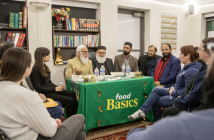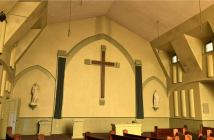In a polarizing election year, Harper’s disturbing rhetoric
Last Updated March 16, 2015 – 4:02pm

Remember the days when the Conservative government talked about nothing but creating jobs and staving off financial catastrophe? That was roughly 2008-2014. The joke back then was that Stephen Harper would invite the guys over on Friday night, to focus on the economy.
That focus was said to be laser-like, because our economy was under threat from global menaces. Other priorities were put aside.
Lately, focusing laser beams on the economy has fallen out of fashion. The unemployment rate is just back to where it was when the Conservatives took power. The economy is growing, but barely. Alberta lost 14,000 jobs in February. Even the federal budget was delayed.
The economy doesn’t poll the way it used to, either. In an election year, that matters.
Public surveys suggest Canadians want protection, not from bankers any more, but from bombers. The Harper government is riding that, becoming harsher and more bellicose by the day about the threat posed by “jihadi terrorists.”
It makes you wonder what’s turning up in the Conservative Party’s internal polling. Are Canadians becoming less tolerant? Can politicians say things about minorities now that would previously have been unacceptable?
Last week, the prime minister suggested some Islamic practices, like face covering, arise from “a culture that is anti-women.” His MPs cheered and no doubt many Canadians agreed. Harper is speaking to those people, and his party is raising funds from them.
Muslim leaders are growing concerned about the hardening of Canadians’ attitudes toward them, a hardening that is being fostered by the government’s own words. Meanwhile, 38 Canadian imams issued a fatwa, or ruling on Islamic law, condemning the ISIS movement in Iraq and Syria as un-Islamic and contrary to the faith. It promised the “wrath of Allah in this world and in the next world” on those who join the ISIS campaign.
Here in Canada, the statement might be hailed as a victory for moderation, if anyone’s listening. At the same time, Islamist radicals will see the Canadian imams as insufficiently militant, as Muslims who have gone soft on the putative Western threat to their faith.
In that sense, it’s a mirror image of the Conservative argument that opposing bombing missions and troops in Iraq makes you soft on terrorism. There’s a race toward extremes that is actually pretty dangerous.
Like other Canadians, most Muslims in this country seek safety, peace and prosperity for themselves and their families. They also understand the anti-Western grievances at play in the Middle East, so they’re caught in the middle.
Their concern is evident in the words of Winnipeg Imam Syed Soharwardy, who criticized Harper’s rhetoric. Soharwardy suggested harsh talk from the top of the Canadian government might actually increase sympathy for militant groups like ISIS. “These people use these words so loosely that it makes everybody push back to having sympathy for terrorist organizations,” he said. “One of the factors in the rise of terrorism is because of this Islamophobia and because of the misuse of (such) words by government officials.”
The problem with beating the drums about Muslims and terror is that instead of opposing what they do, we risk condemning who they are. That leaves little room for dialogue or understanding.
And the prime minister is not alone, a fact not lost on the Muslim community. The whole party is talking about jihadi extremism and foreign threats.
New Brunswick Conservative MP John Williamson had to apologize for describing “whities” and “brown people” competing for Canadian jobs. That wasn’t just a gaffe. Williamson is a former communications director for Harper. Winnipeg Conservative MP Lawrence Toet suggested in a mail-out that opposing the government’s new surveillance legislation means you see the terrorists as the victims.
These guys are backbenchers, but you have to wonder whether their words don’t get tacit approval from the party’s higher-ups. Either that or the government’s words and actions have unleashed something new and disturbing in our politics.
Dan Leger is a freelance journalist in Halifax.




